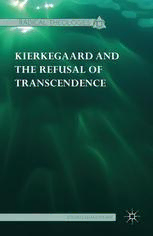
Kierkegaard and the Refusal of Transcendence PDF
Preview Kierkegaard and the Refusal of Transcendence
Radical Theologies Radical Theologies is a call for transformational theologies that break out of tradi- tional locations and approaches. The rhizomic ethos of radical theologies enable the series to engage with an ever-expanding radical expression and critique of the- ologies that have entered or seek to enter the public sphere, arising from the con- tinued turn to religion and especially radical theology in politics, social sciences, philosophy, theory, cultural, and literary studies. The post-theistic theology both driving and arising from these intersections is the focus of this series. Series Editors Mike Grimshaw is associate professor of Sociology at Canterbury University in New Zealand. Michael Zbaraschuk is lecturer at the University of Washington, Tacoma, and visiting assistant professor at Pacific Lutheran University. Joshua Ramey is visiting assistant professor at Haverford College. Religion, Politics, and the Earth: The New Materialism By Clayton Crockett and Jeffrey W. Robbins The Apocalyptic Trinity By Thomas J. J. Altizer Foucault/Paul: Subjects of Power By Sophie Fuggle A Non-Philosophical Theory of Nature: Ecologies of Thought By Anthony Paul Smith On Philosophy as a Spiritual Exercise: A Symposium Edited by Philip Goodchild The Counter-Narratives of Radical Theology and Popular Music: Songs of Fear and Trembling Edited by Mike Grimshaw Theology after the Birth of God: Atheist Conceptions in Cognition and Culture By F. LeRon Shults Theopoetics of the Word: A New Beginning of Word and World By Gabriel Vahanian; Foreword by No ë lle Vahanian Economics in Spirit and Truth: A Moral Philosophy of Finance By Nimi Wariboko Retrieving the Radical Tillich Edited by Russell Manning Kierkegaard and the Refusal of Transcendence By Steven Shakespeare Kierkegaard and the Refusal of Transcendence STEVEN SHAKESPEARE KIERKEGAARD AND THE REFUSAL OF TRANSCENDENCE Copyright © Steven Shakespeare 2015 Softcover reprint of the hardcover 1st edition 2015 978-1-137-38675-5 All rights reserved. No reproduction, copy or transmission of this publication may be made without written permission. No portion of this publication may be reproduced, copied or transmitted save with written permission. In accordance with the provisions of the Copyright, Designs and Patents Act 1988, or under the terms of any licence permitting limited copying issued by the Copyright Licensing Agency, Saffron House, 6-10 Kirby Street, London EC1N 8TS. Any person who does any unauthorized act in relation to this publication may be liable to criminal prosecution and civil claims for damages. First published 2015 by PALGRAVE MACMILLAN The author has asserted their right to be identified as the author of this work in accordance with the Copyright, Designs and Patents Act 1988. Palgrave Macmillan in the UK is an imprint of Macmillan Publishers Limited, registered in England, company number 785998, of Houndmills, Basingstoke, Hampshire, RG21 6XS. Palgrave Macmillan in the US is a division of Nature America, Inc., One New York Plaza, Suite 4500, New York, NY 10004-1562. Palgrave Macmillan is the global academic imprint of the above companies and has companies and representatives throughout the world. E-PDF ISBN: 978–1–137–38295–5 ISBN 978-1-349-56471-2 ISBN 978-1-137-38295-5 (eBook) DOI: 10.1057/9781137382955 Distribution in the UK, Europe and the rest of the world is by Palgrave Macmillan®, a division of Macmillan Publishers Limited, registered in England, company number 785998, of Houndmills, Basingstoke, Hampshire RG21 6XS. Library of Congress Cataloging-in-Publication Data Shakespeare, Steven, 1968– Kierkegaard and the refusal of transcendence / Steven Shakespeare. pages cm.—(Radical theologies) Includes bibliographical references and index. ISBN 978-1-349-56471-2 1. Kierkegaard, Søren, 1813–1855. I. Title. B4377.S424 2015 198(cid:2).9—dc23 2015014750 A catalogue record of the book is available from the British Library. For Jake This page intentionally left blank Contents Series Preface ix Acknowledgments xi List of Abbreviations xiii Introduction 1 1 Kierkegaard and the Limit of Analogy 21 2 Distinctions: Marks of the Paradox 47 3 The Paradox Is Not One: Transfiguring Transcendence 77 4 Monstrance: Articulating the Paradox 101 5 Silhouettes: Figuring the Immanent Paradox 1 37 6 Satan’s Angel: The Interruption of the Demonic 159 7 Kierkegaard, Spinoza, and the Intellectual Love of God 179 Conclusion: Theology for Creatures 197 N otes 209 B ibliography 2 19 I ndex 223 This page intentionally left blank Series Preface Radical Theologies encompasses the intersections of constructive theology, secular theology, death of god theologies, political theologies, continental thought, and contemporary culture. For too long, radical theology has been wandering in the wilderness, while other forms of theological discourse have been pontificating to increasingly smaller audiences. However, there has been a cross-disciplin- ary rediscovery and turn to radical theologies as locations from which to engage with the multiplicities of twenty-first century society, wherein the radical voice is also increasingly a theologically engaged voice with the recovery and rediscovery of radical theology as that which speaks the cri- tique of “truth to power.” Radical Theologies reintroduces radical theological discourse into the public eye, debate, and discussion by covering the engagement of radi- cal theology with culture, society, literature, politics, philosophy, and the discipline of religion. P roviding an outlet for those writing and thinking at the intersections of these areas with radical theology, Radical Theologies expresses an inter- disciplinary engagement and approach. This series, the first dedicated to radical theology, is also dedicated to redefining the very terms of theology as a concept and practice. J ust as Rhizomic thought engages with multiplicities and counters dualistic and prescriptive approaches, this series offers a timely outlet for an expanding field of “breakout” radical theologies that seek to redefine the very terms of theology. This includes work on and about the so-labeled death of god theologies and theologians who emerged in the 1960s and those who follow in their wake. Other radical theologies emerge from what can be termed underground theologies and also a/theological foundations. All share the aim and expression of breaking out of walls previously ideo- logically invisible.
